You’re reading the free version of The Morning Dispatch. Consider joining as a paid member to get full access to our news, analysis, community comments, and live events.
Happy Wednesday! A 21-year-old Norwegian tourist recently claimed he was denied entry to the United States after immigration authorities discovered a meme of Vice President J.D. Vance on his phone camera roll. The digitally altered image featured the vice president with a bald, egg-shaped head.
We’re heartened to know that the long-promised immigration crackdown is keeping out such hardened criminals.
Quick Hits: Today’s Top Stories
- New York state lawmaker Zohran Mamdani won a significant plurality—43.5 percent as of early Wednesday morning—in the Democratic primary for New York City mayor on Tuesday. The 33-year-old democratic socialist’s closest opponent, former New York Gov. Andrew Cuomo at 36.4 percent, conceded defeat on Tuesday night. The election used a ranked-choice voting system, meaning that—as none of the candidates received more than 50 percent of the vote share—voters’ lower-ranked preferences will be factored into the final tally. The New York City Board of Elections is expected to announce the final results on July 1, after the ranked-choice tabulations are factored in. But Mamdani is poised to move on to the November general election and face embattled incumbent Mayor Eric Adams and Republican Curtis Sliwa. “Tonight we made history,” the progressive Mamdani said in a victory speech. “In the words of Nelson Mandela, it always seems impossible until it is done. My friends, we have done it.”
- The ceasefire between Israel and Iran continued to hold on Tuesday, despite both countries accusing the other of violating the agreement to pause fighting. Early Tuesday morning, the Israeli military accused Iran of firing at least three ballistic missiles after the ceasefire took effect, with multiple sources reporting booms from apparent interceptions. Iran denied the claims and alleged that Israel broke the truce. In a statement following the Iranian missile barrage, Israeli Defense Minister Israel Katz said the military would “respond forcefully in the heart of Tehran.” Israel struck a radar system in Tehran but refrained from further attacks. The ceasefire breaches followed heavy bombardment by both sides in the hours leading up to the truce. In Israel’s southern city of Be’er Sheva, an Iranian missile hit an apartment building, killing at least four people and wounding 20. Later on Tuesday, President Donald Trump vented his frustration with both sides over the truce violations, telling reporters that Israel needed to “calm down.”
- A preliminary report by the Defense Intelligence Agency leaked Tuesday stated that the U.S. strikes on Iran did not fully destroy the Iranian nuclear program, likely only setting it back by months. A source familiar with the report told CNN that Iran’s centrifuges and enriched uranium were not destroyed, casting doubt on the Trump administration’s claims that the strikes eliminated Iran’s nuclear program. But the early assessment, which relies on satellite imagery and signals intelligence rather than on-the-ground inspectors, is reportedly “low confidence” and focuses only on the underground Fordow nuclear facility. In a statement Tuesday, White House press secretary Karoline Leavitt said that the “alleged assessment is flat-out wrong,” maintaining that the operation resulted in the “total obliteration” of Iran’s nuclear program.
- Leaders of NATO countries convened in the Hague, Netherlands, on Tuesday for the military alliance’s annual summit, which will continue through today. Members of the 32-member alliance are expected to commit to spending 5 percent of their gross domestic product on defense by 2035, up from the previous benchmark of 2 percent. Before departing for the summit, Trump cast doubt on whether the U.S. would adhere to NATO’s Article 5, which outlines the commitment to mutual defense between member nations. “There are numerous definitions of Article 5,” Trump told reporters. “But I’m committed to being their friends.”
- Russia launched missile barrages at southeastern Ukraine on Tuesday, killing at least 17 people and injuring hundreds more. The attack comes a day after 10 people were killed in Kyiv and only a week after the deadliest Russian bombing this year, which killed 28 people. Ukrainian President Volodymyr Zelensky arrived at the NATO summit Tuesday, where he is set to meet with Trump to discuss the prospect of weapons purchases and sanctions on Russia.
- Federal Reserve Chair Jerome Powell indicated Tuesday that the central bank may not cut rates at its July meeting, stating that the Fed is “well positioned to wait to learn more about the likely course of the economy before considering any adjustments to our policy stance.” The remarks, made during testimony before the House Financial Services Committee, seemed to contradict two Federal Reserve officials who suggested that they would be open to cutting rates as soon as next month. Despite pressure from President Trump to lower rates, Powell has maintained that the Fed needs to wait to assess the longer-term effects of the administration’s sweeping tariffs.
Your Personal Info Is Out There — Incogni Helps Wipe It Clean

Europe Eyes ‘Burden Shifting’ on Defense Spending

A lot has changed since President Donald Trump last attended a NATO summit in 2019. Afghanistan had not yet fallen to Taliban fighters. Russia had not yet launched its full-scale invasion of Ukraine. And Hamas terrorists had not yet breached southern Israel, plunging the Middle East into a period of instability that would eventually culminate in an American attack on Iran’s nuclear program.
But one thing has remained constant more than five years later: Trump’s undisguised skepticism toward the transatlantic alliance. When asked Tuesday whether the U.S. would adhere to NATO’s Article 5 mutual defense guarantee—an attack on one member is an attack on all—the U.S. president offered a noncommittal response: “Depends on your definition. There’s numerous definitions of Article 5. You know that, right? But I’m committed to being their friends.”
As a non-paying reader, you are receiving a truncated version of The Morning Dispatch. You can read our full item on this week’s NATO summit in the members-only version of TMD.
Trump’s return loomed large as NATO leaders convened in the Hague, Netherlands, on Tuesday for a two-day gathering focused on boosting the alliance’s defense spending. The annual gathering, which came against the backdrop of the ongoing war in Ukraine and an uneasy truce in the Middle East, will be an early test of the transatlantic relationship under a new American administration.
All 32 allies are expected to sign a pledge to raise their military spending from the benchmark of 2 percent of their gross domestic product to 5 percent by 2035. In theory, 3.5 percent of that would go toward “hard defense” expenditures such as troops and weaponry, while 1.5 percent would go toward security infrastructure, including cyber and intelligence capabilities. But the alliance faces an uphill battle in implementing across-the-board spending hikes. As of 2024, eight countries—including Canada, Spain, and Italy—were still falling short of even the 2 percent GDP target, which was agreed upon more than 10 years ago. And none of them have yet passed the 5 percent threshold. Poland is the closest at 4.1 percent, followed by Estonia and the U.S. at 3.4 percent.
In an interview with TMD ahead of the summit, Norwegian Foreign Minister Espen Barth Eide emphasized the importance of a greater European commitment to the continent’s shared security. “It is important that Europe’s willing to take more of the burden,” he said, “so not only burden sharing, but burden shifting.” And the increased spending must be accompanied by the understanding that “we have to spend smarter, more strategically, more together, and that we have to have an agreement about what the threat perceptions are,” he added.
Ensuring that fellow NATO members contribute to the alliance’s collective defense has long been one of Trump’s key priorities. “We’re paying for a big proportion of NATO, which is basically protecting Europe,” Trump said in 2019, singling out Germany for not paying its “fair share.” On Tuesday, NATO Secretary-General Mark Rutte praised the president for catalyzing the alliance’s increased spending. “You will achieve something NO American president in decades could get done,” Rutte wrote in a private message shared by Trump on social media. “Europe is going to pay in a BIG way, as they should, and it will be your win.”
And indeed, the renewed European emphasis on defense appears at least partly driven by the prospect of an American retreat from the continent’s security. “This new urgency for defense is only partly because of Russia, because of Vladimir Putin,” Liana Fix, a fellow for Europe at the Council on Foreign Relations, told TMD. “To a larger extent, it is because of the fear that Europeans might not be able to secure the future of their citizens without the United States.”
These concerns likely stem from public statements by Trump and other administration officials attacking Washington’s European allies. But there’s also a growing understanding among leaders that the continent is becoming less of a priority for the U.S. amid instability in the Middle East and growing fears about an increasingly aggressive China. “There’s been a really growing broad acceptance across NATO, Europe, that the geopolitical landscape has changed,” Stuart Dee, a research leader in defense and security at the Rand Europe think tank, told TMD. “The U.S.’s security priorities are increasingly pulled in many different directions, and Europe’s place in that agenda is changing.”
But for countries on Russia’s doorstep, the ongoing war in Ukraine remains a key issue. Countries closer to Russia are seeking not only to prepare their economies for war, but also their politics and societies. Nordic nations—including Norway, Sweden, Finland, and Denmark—along with the Baltic states—Lithuania, Estonia, and Latvia—all already have or have recently reintroduced some form of mandatory military service.
In Norway, roughly 10,000 men and women are selected each year from a broader pool of call-ups, in a distinctive “competitive conscription model.” This year, the draft included Princess Ingrid Alexandra, the 19-year-old daughter of Crown Prince Haakon. But preparing a nation for the threat of armed conflict goes beyond military service, Eide told TMD.
“If you’re responsible in peace, you’re responsible in war,” the Norwegian foreign minister said, explaining how owners of critical infrastructure like water supply, electricity, and telecommunications are now being told to prepare their facilities with redundancies and the ability to make quick repairs. Average citizens are also being asked to stockpile supplies in case of a loss of power or other disruption in critical services in the event of a Russian hybrid operation.
Other countries are taking even more drastic steps. Poland recently unveiled plans to triple its number of active-duty military personnel over the next 10 years and massively expand its reserve forces. In March, Prime Minister Donald Tusk announced that military training, although not mandatory service, would be introduced for every adult male. “It must become a habit, an obvious tradition that every healthy man in Poland should want to train in case of [the necessity to] defend the homeland,” he said.
But European countries further from the frontlines are only just beginning to grapple with the possibility of greater conflict. In the United Kingdom, for example, this has taken the form of a popular fictional podcast, The Wargame, in which former senior politicians acted as part of a British government confronting Russian aggression. In Germany, training programs to prepare citizens for the Bundeswehr, or land forces, have been expanded, with plans for some form of mandatory service currently being debated.
Ahead of the NATO summit, German Chancellor Friedrich Merz underscored Berlin’s defense U-turn in an address to parliament. “For far too long, we in Germany didn’t want to hear our Baltic neighbors’ warnings about Russia’s imperialist policies,” he said. “We have recognized this mistake—and there is no going back from this realization.”
But amid friction between Kyiv and Washington, Ukraine’s relationship with the transatlantic alliance remained in limbo going into this year’s gathering. The uncertainty marks a sharp departure from last year, when leaders committed to Ukraine’s “irreversible path” to NATO membership. Ukrainian President Volodymyr Zelensky is expected to meet with Trump today in a bid to purchase American weapons and encourage the West to ramp up sanctions on Russia.
For Europe’s part, Ukraine’s ability to prevail in the ongoing war is important both in itself and for the future of the continent’s security. “What I raised with all my counterparts in Washington is that it’s important not to see Ukraine just as Ukraine. There’s every reason to stand in solidarity with the brave people of Ukraine, but it’s actually about European security,” Eide said. “All wars end, and after this war, there will be a post-war order. That post-war order has to be solid and sound and predictable, and not full of unfulfilled promises, unsettled issues, simmering conflicts.”
“The desire to move quickly to peace is not bad, but it has to be a good peace. It has to be just and lasting,” he added. “A cheap ceasefire can lead to a very expensive peace.”
Today’s Must-Read
There is more than one way to do regime change. In Iraq, the United States ended up invading and occupying the country, deposing Saddam Hussein, and trying and failing to set up a durable reform and reconstruction project along the lines of what was done in postwar Japan. Now lacking the appetite for such multigenerational projects, the United States left Iraq free of one brutal caudillo but subject to a series of setbacks and disasters: Baathist revanchism, the Islamic State, Iranian interference. Iraq is better off today than it was under Saddam Hussein (a very low bar to clear), but the overthrow of that earlier regime did not produce the results the United States wanted. Another way of saying this is that when it comes to regime change, the change is more important than the regime.
Toeing the Company Line
Three Histories of the Iran War
All sides are primed to disown ‘the Trump doctrine.’
No, the Iran Bombing Is Not ‘Just Like Iraq’
Trump’s decision is fair game for criticism, but the comparisons to the Iraq War fall flat.
Republicans Take Aim at the CBO’s Math
But experts defend the Congressional Budget Office’s deficit projections for Trump’s One Big Beautiful Bill.
Donald Trump Jr. Makes Unfounded Claim That Minnesota Shooter Was a Democrat
Reporting indicates the man charged in the deaths of a state representative and her husband is a Republican.
What Comes Around Goes Around
Iran tastes its own medicine.
The Goldberg Doctrine
I’m looking at the Goldberg in the mirror …
Worth Your Time
- In a timely exclusive for National Review, Dispatch alumna Audrey Fahlberg looked back at the Trump 2024 campaign’s efforts to keep the then-presidential candidate safe amid threats from Iran. “From very early on in the 2024 cycle, senior Trump campaign staff were extremely concerned about foreign adversaries hacking the campaign or even physically harming Trump in order to prevent the election of a president they viewed as a unique threat among the potential candidates for office. The concerns were heightened by a belief that the Biden White House was refusing to provide Trump and his campaign with sufficient Secret Service protection. As the campaign progressed, senior Trump campaign staffers began receiving new information surrounding Tehran’s assassination plots against Trump, and began hearing from intelligence officials that the Iranians were growing increasingly committed to hacking their communications. Few staffers were clued into the high-level threat surrounding active hacking operations from the Iranians and active assassination plots from Tehran, but senior campaign officials were very wary,” Fahlberg wrote. “Toward the end of the campaign, security was heightened. Post-Butler, sources say there was a night and day difference in terms of the security assets they were given, from drone defense to vehicles. Following the Butler assassination attempt, campaign staffers recall senior aides becoming more worried about drones at the president’s residences and rallies, though junior and mid-level campaign aides say senior staff did their best to keep calm and collected. In one reported incident, a Secret Service agent shot down a drone following the president’s motorcade.”
Presented Without Comment
ABC News: Trump Blurts Out Expletive as He Lashes Out at Israel and Iran Over Ceasefire
Also Presented Without Comment
Cincinnati Enquirer: NKY’s Rep. Thomas Massie Zings J.D. Vance, Continuing Feud With White House
A Northern Kentucky congressman took a jab at Vice President J.D. Vance in a post on X on June 24, continuing a feud with the White House.
“I wonder if other VPs had as much excitement as I do,” Vance, a former U.S. Senator from Ohio, said in a post.
U.S. Rep. Thomas Massie, who represents Kentucky’s 4th District, responded: “Ask Mike Pence about his last month.”
In the Zeitgeist
Brad Pitt’s latest, F1, will hit theaters this Friday. Pitt stars as Sonny Hayes, a grizzled veteran race car driver eager to coach a rookie racer played by Damson Idris. But a big-name cast is only half the draw: The film was directed by Joseph Kosinski (of Top Gun: Maverick fame) and features a score by iconic composer Hans Zimmer.
Let Us Know
Do you think Trump’s criticisms about European burden-sharing are warranted?

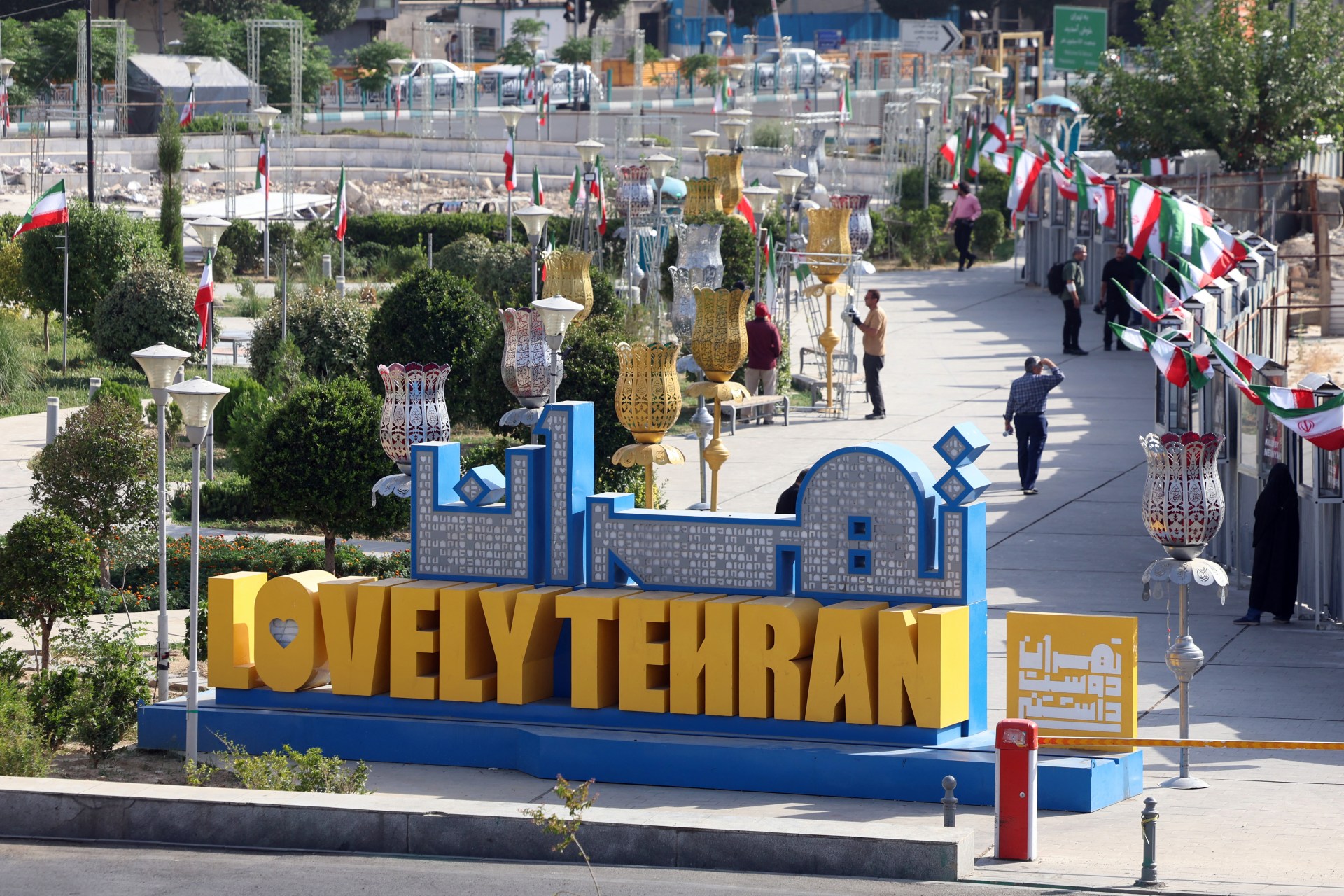
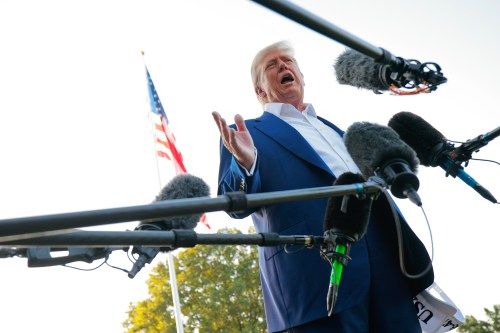

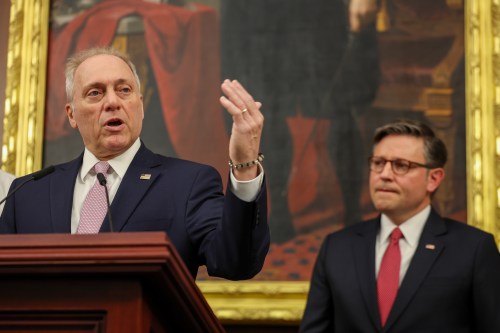
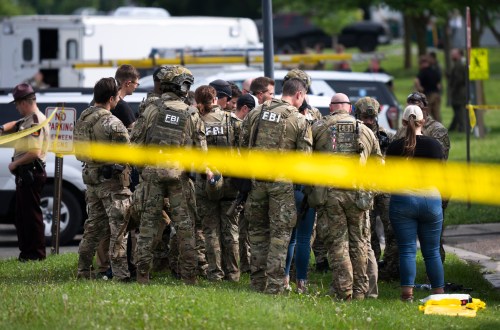
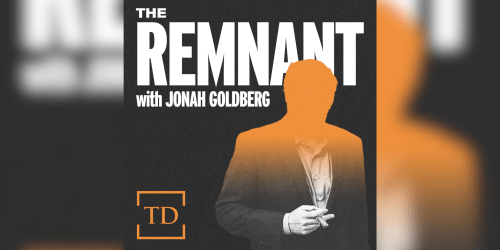




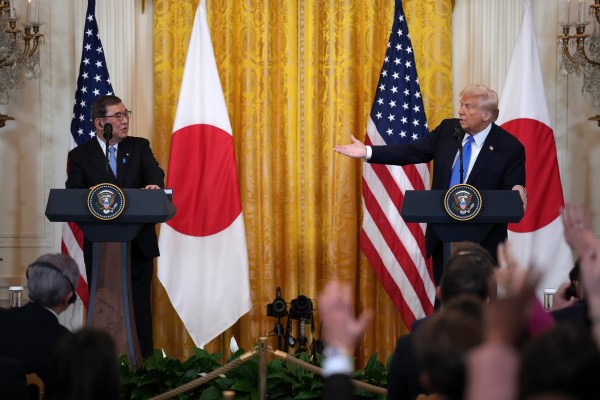
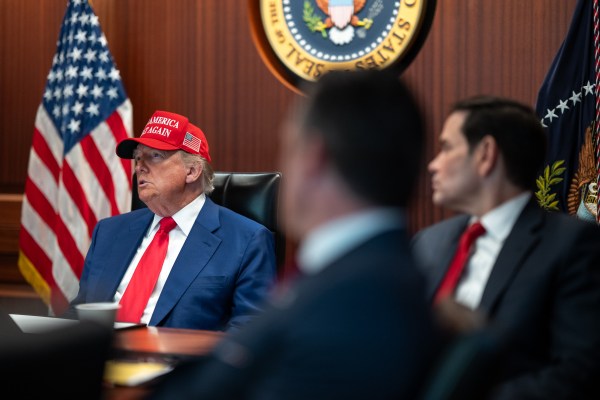
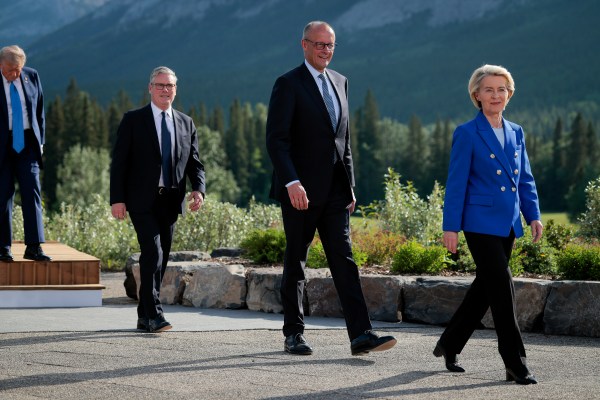
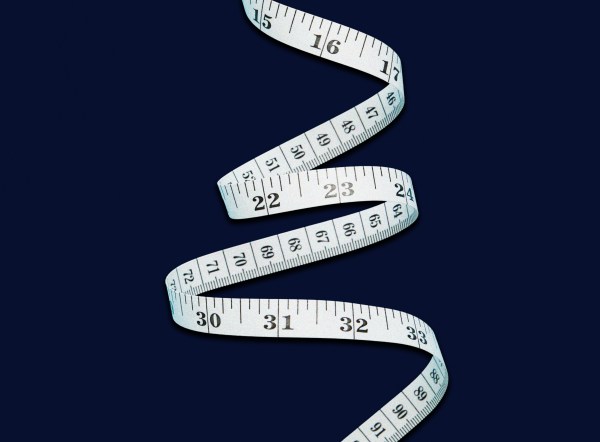
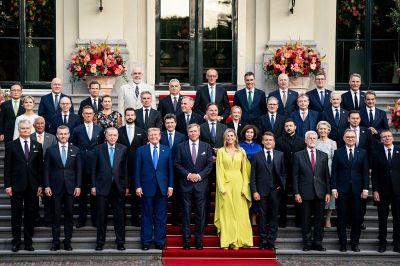
Please note that we at The Dispatch hold ourselves, our work, and our commenters to a higher standard than other places on the internet. We welcome comments that foster genuine debate or discussion—including comments critical of us or our work—but responses that include ad hominem attacks on fellow Dispatch members or are intended to stoke fear and anger may be moderated.
With your membership, you only have the ability to comment on The Morning Dispatch articles. Consider upgrading to join the conversation everywhere.